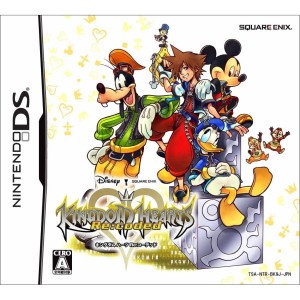 Kingdom Hearts is undoubtedly one of Square Enix’s most beloved franchises despite the fact that the series hasn’t had a release on a major console since 2005. If I have to count Re: Chain of Memories, then it was 2008. Since KH2’s release, Kingdom Hearts has only been found on three portable games: 358/2 Days, Birth by Sleep, and now, Re:Coded. Re:Coded is actually a conglomeration of a set of episodes of phone-only games from Japan, which started in 2005 not long after KH2’s release and only finished shortly after the release of BBS. As one might expect, Re:Coded plays like a bunch of ported phone games–which is as great as it sounds–and the story plays out like the writers were writing it off the cuff–which they probably were.
Kingdom Hearts is undoubtedly one of Square Enix’s most beloved franchises despite the fact that the series hasn’t had a release on a major console since 2005. If I have to count Re: Chain of Memories, then it was 2008. Since KH2’s release, Kingdom Hearts has only been found on three portable games: 358/2 Days, Birth by Sleep, and now, Re:Coded. Re:Coded is actually a conglomeration of a set of episodes of phone-only games from Japan, which started in 2005 not long after KH2’s release and only finished shortly after the release of BBS. As one might expect, Re:Coded plays like a bunch of ported phone games–which is as great as it sounds–and the story plays out like the writers were writing it off the cuff–which they probably were.
For those who are just dying to replay the first Kingdom Hearts game with a bunch of twists in game mechanics, then you will love everything about the gameplay, especially if you’re a fan of retro games. Without getting into the story too much, the basic premise is that Jiminy’s Journal has been riddled with bugs and it’s up to King Mickey and the gang to debug the journal and uncover the mystery as to why the journal is completely blank for the Chain of Memories sequences. Since the CoM portions are blank, the entries from the first game will have to be fixed. So yes, get ready to revisit most of the worlds Sora visited in both the first Kingdom Hearts and CoM.
Players do control Sora yet again–although this time he’s a virtual version (seriously, don’t ask)–and he does pretty much what he’s always done: beat up Heartless. This time though, he also has to clear all of the bug blox littered in the worlds and eliminate the sources of the bugs in each world. The sources are sometimes boss fights and sometimes they are extra levels within the world. Sora has the same arsenal of attacks, magic, and items and accessories as he usually has, although this time around, accessing them and selecting them comes straight from the user manual of BBS. Another noticeable difference is how Sora levels up, which is through his virtual motherboard complete with data chips, and this format should be very familiar to anyone who has played either Final Fantasy X or Final Fantasy XIII.
Instead of consisting of straight up action like Sora’s other games, Re:Coded offers a few throwbacks to gameplay of older, 2D games. For some boss fights, Sora will fight in a 2D side-scroller like one would find in MegaMan. At other times, Sora will have to traverse a 2D arena of platforming to get to the next world. In the Olympus Coliseum, since Sora can recruit Cloud into his party, all battles are fought via turn-based play–which made me laugh really hard. Even though I’m not a fan of 2D retro mechanics or traditional turn-based play, incorporating these here in this game about data was actually fun and refreshing from the typical KH gameplay. If I’m going to have to fight all the same bosses from the first game, might as well make the battles more interesting.
One more note: beware of boss fights. Since this is a collection of games, be prepared to sit through 3-5 boss fights in a row with no save points at various points in the game. I have to assume that these were how the episodes ended, but it didn’t make them any more bearable.
The story, something which is usually the franchise’s strong point, is possibly the weakest of the series, if not tied with 358/2 Days. The fact that Mickey created a virtual Sora to debug the journal nabbed an instant eye-roll, and the fact that the developers thought to include Maleficent and Pete at all also earned an annoyed sigh. At first it seemed like maybe they were going to explain what happened to the duo at the end of KH2, but then that was never addressed. They decided that they wanted to rule the virtual world of the journal, which really made little sense. Riku’s inclusion was also very unnecessary, but at the same time, he had to be there for proper fanservice. I just think they could have brought him in a better way than making him be Sora’s embodiment for the Journal’s heart.
As the story continued, the plot points tying it to the other games became weaker and weaker. I don’t want to spoil what happened, but basically, the ending to Re:Coded explains what was in the message in the bottle that King Mickey sent to Sora at the end of KH2. What was in that message could all be explained by playing the last two episodes of the game. The first few had little to nothing to do with the ending of the game. Somewhere along the line of writing the episodes, the developers decided to turn Re:Coded into a core game, so the game shifted toward the plotlines of CoM and BBS. The shift is very obvious when it occurs, which really gives the player the feeling that the writing of the episodes was done on the fly.
Can I recommend this game to others? Only if you’re a die-hard KH fan. If you’ve never played any of the games, do not pick up this one. In fact, I wouldn’t pick it up unless you’ve played all of the others, because otherwise the ending will make zero sense to you. In addition, you really don’t need to play this game to know what’s going on in the story. Sure, I learned what Mickey told Sora, but I would have found that out anyway at the start of Kingdom Hearts 3.
Hopefully this is the last of the un-numbered KH games so we can move on to what should be the final piece in Sora and Roxas’ story. If you don’t understand what I mean by that, then go play Birth by Sleep.


Leave a Reply